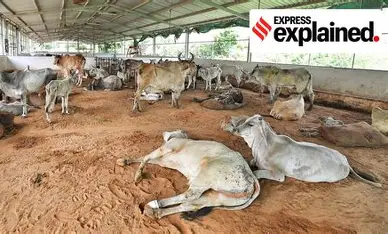Madrid, October 6, 2025 — Spanish authorities have ordered the culling of thousands of cattle in several northern provinces in a desperate attempt to contain the rapid spread of lumpy skin disease (LSD), a highly contagious viral infection threatening the country’s livestock industry and export markets.
The Ministry of Agriculture, Fisheries and Food (MAPA) confirmed that outbreaks have been detected across Castile and León, Galicia, and Asturias, prompting emergency containment measures, transport restrictions, and the deployment of veterinary response teams to affected areas. The virus, which primarily affects cattle, causes fever, skin nodules, reduced milk yield, and in severe cases, death.
Officials say the outbreak poses a serious threat to Spain’s €10 billion cattle industry. “We are implementing immediate biosecurity and vaccination measures to stop further transmission,” said Luis Planas, Spain’s Minister of Agriculture. “All infected herds and animals showing clinical symptoms are being culled under EU disease control regulations.”
The government has established protection and surveillance zones extending several kilometers around each outbreak site, with cattle movements strictly prohibited except under veterinary supervision. Farmers within the affected zones are required to report any symptoms immediately and enhance disinfection protocols on farms, vehicles, and equipment.
Spain’s national veterinary laboratory confirmed that the strain detected is closely related to recent outbreaks in Portugal and southern France, raising fears of cross-border spread within the European Union. The European Commission has been briefed and is coordinating support through its Animal Health Emergency Response system.
“This is one of the most serious animal health challenges Spain has faced in years,” said Dr. Carmen López, a veterinary epidemiologist at the University of Zaragoza. “Lumpy skin disease spreads rapidly through biting insects and can devastate livestock populations if not contained quickly.”
While the disease does not pose a risk to humans, its economic impact is substantial. The culling effort, movement restrictions, and trade suspensions are expected to cost Spain’s farming sector tens of millions of euros. Exports of live cattle and beef products from affected areas have been temporarily halted, with neighboring countries tightening border checks.
The Spanish government has announced a compensation package for farmers forced to destroy livestock, covering both direct losses and business disruption. “We know how devastating this is for our farmers,” said Planas. “Compensation and emergency aid will be provided as swiftly as possible.”
Farmers’ associations have welcomed the aid but warned that delays in payments could push smallholders into bankruptcy. “Some of these farms are family-run operations that cannot survive without immediate financial support,” said Juan Carlos Domínguez, spokesperson for the National Cattle Producers Federation. “The government must ensure rapid compensation and improve early warning systems.”
Veterinary teams are also rolling out an emergency vaccination campaign across at-risk regions using approved live-attenuated LSD vaccines, a key tool in halting transmission. However, experts warn that controlling the disease will require sustained efforts throughout the winter, when insect activity typically decreases but virus persistence remains possible.
Satellite monitoring and drone surveillance are being used to track herd movements and enforce quarantine zones. The Ministry of Agriculture is collaborating with regional authorities and EU animal health experts to evaluate containment progress weekly.
Spain’s outbreak comes amid a broader resurgence of livestock diseases across Europe linked to warmer temperatures and expanded insect populations. Climate scientists say that rising humidity and prolonged summer seasons are creating ideal conditions for disease vectors such as mosquitoes and biting flies to thrive.
“Climate change is increasing the frequency of vector-borne livestock diseases in Europe,” said Dr. López. “Without stronger biosecurity infrastructure, outbreaks like this will become more common.”
The European Union has pledged additional funding for research into LSD-resistant cattle breeds and improved vaccines. In the meantime, Spanish farmers are being urged to remain vigilant as veterinary teams continue surveillance and testing in high-risk zones.
As the culling operations continue, local authorities are racing to reassure the public that the country’s food supply remains safe. Beef products on the market are unaffected, as only infected and exposed animals are being destroyed under controlled veterinary supervision.
For Spain’s agricultural heartlands, however, the emotional toll is heavy. “Losing entire herds feels like losing part of your family,” said Domínguez. “But we have no choice if we want to protect the rest of the country’s livestock.”



